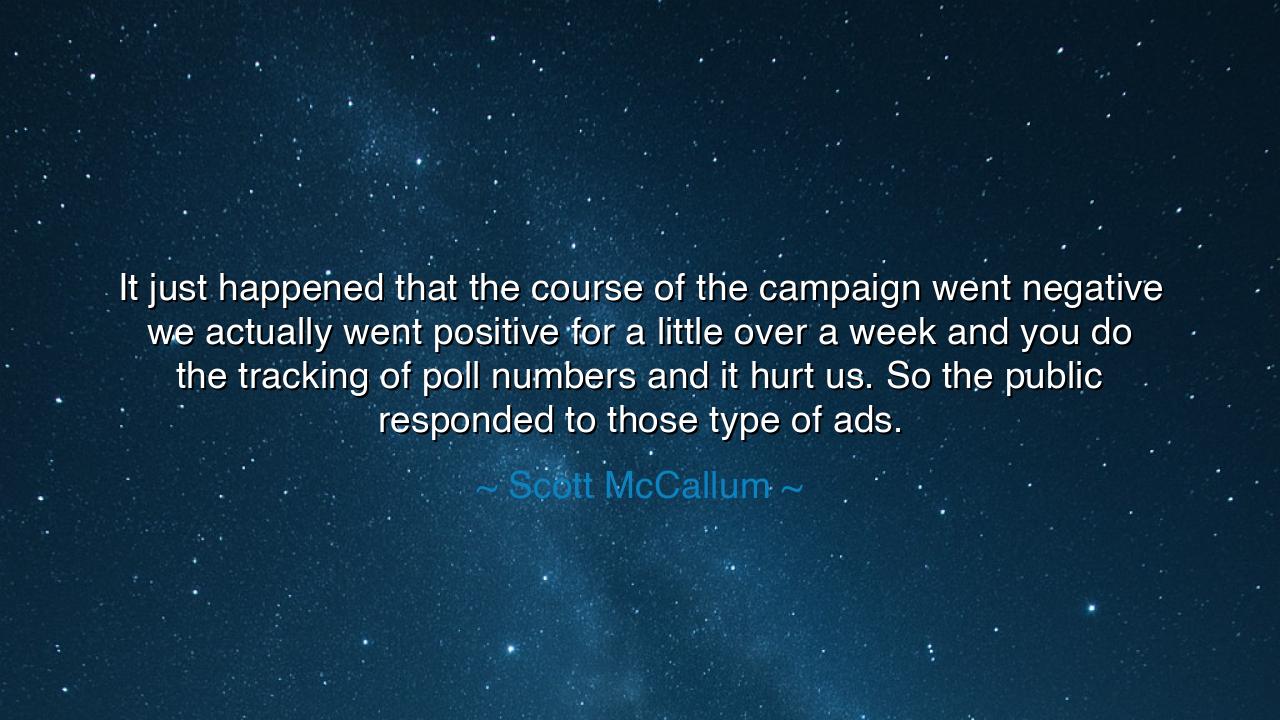
It just happened that the course of the campaign went negative
It just happened that the course of the campaign went negative we actually went positive for a little over a week and you do the tracking of poll numbers and it hurt us. So the public responded to those type of ads.






The words of Scott McCallum, “It just happened that the course of the campaign went negative … we actually went positive for a little over a week and you do the tracking of poll numbers and it hurt us. So the public responded to those type of ads,” are not merely the musings of a politician, but a revelation about the fickle nature of human perception. Here is exposed a paradox: that what ought to inspire—the positive—may falter, while what ought to repel—the negative—may prevail. Such is the strange mirror of politics, where the crowd is stirred more easily by fear than by hope.
The origin of this truth is as old as rhetoric itself. In the forums of ancient Rome and the assemblies of Athens, speakers learned quickly that negative appeals—warnings of enemies, tales of corruption, cries of danger—stirred the hearts of the multitude more swiftly than calm visions of peace. Human beings, bound by instinct, are ever quicker to defend against threat than to embrace harmony. The campaign, therefore, becomes not a battlefield of ideas alone, but a contest of passions, where the darker notes strike deeper chords.
Consider the story of Lyndon B. Johnson’s 1964 presidential campaign, which unleashed the infamous “Daisy” advertisement. In a single haunting minute, the image of a child plucking petals dissolved into the flash of nuclear fire, searing into the minds of the public a fear of Barry Goldwater’s alleged recklessness. It was not a speech of prosperity, nor a vision of hope, but a negative ad that turned the tide of an election. Thus history bore witness to the power McCallum laments: that poll numbers bend more readily to fear than to promise.
Yet the lesson is not one of despair, but of wisdom. If the public responds so readily to shadows, it is the sacred duty of leaders to wield this knowledge with restraint. For though negative campaigns may win the moment, they corrode the soul of democracy, leaving citizens mistrustful, cynical, and divided. A victory won by fear sows seeds of discord that future generations must harvest.
Still, McCallum’s reflection reveals a deeper truth: that politics is not merely about policy, but about the human heart. The challenge is not only to gain power, but to teach the people to value light above darkness, vision above attack, and hope above fear. It is a high calling, rarely fulfilled, but it is the only path by which the campaign may transcend the mire of bitterness and rise into true service of the common good.
Let those who come after remember: the ads may sway the moment, the polls may shape the hour, but only the pursuit of truth and the courage to uplift the people will endure in the chronicles of time. For the measure of a leader is not found in the fear he awakens, but in the hope he dares to plant.






VNPham Hoang Vuong Nguyen
It’s unfortunate that the public often responds better to negative campaigning, even though positive messages may be more hopeful. This could indicate that negative ads often feel more urgent or engaging, perhaps because they highlight immediate threats or problems. But shouldn’t we strive for a better understanding of the issues and candidates beyond what’s negative? How do we move the conversation towards a more thoughtful, positive discourse?
HMHuyen Meu
Scott McCallum’s quote shows how the dynamics of a political campaign can be shaped by the strategy of negativity. But why is it that the public responds to negative ads more? Is it a reflection of a larger media culture where scandals and controversy dominate the narrative? Could there be a way to shift the public's attention back to more constructive and forward-looking discussions in politics?
XTMy Nguyen Xuan Thao
This seems to confirm the idea that negative campaigning can sometimes be more effective, which is a little disheartening. Why does the public seem to respond to negativity so strongly? Could this behavior reflect a deeper cynicism in politics, where people are more skeptical of promises and are drawn to candidates who focus on their opponents’ flaws rather than their own strengths?
TTTra Thanhh
It’s intriguing that McCallum mentions how positive ads had a brief positive impact but ultimately hurt his campaign. Why does negativity often win out in political ads? Is it that voters are more drawn to controversy and conflict rather than hopeful messages, or do they simply feel that negative ads reveal more about the candidate’s true character?
QHNguyen Quoc Hung
This quote brings up an interesting dilemma in modern campaigning: do positive messages truly resonate with voters, or do negative ads have a stronger impact? It seems like the strategy of negativity is often seen as more effective, but what does that say about the public's values? Are we becoming too accustomed to negative campaigning to respond positively when a candidate takes a more optimistic approach?